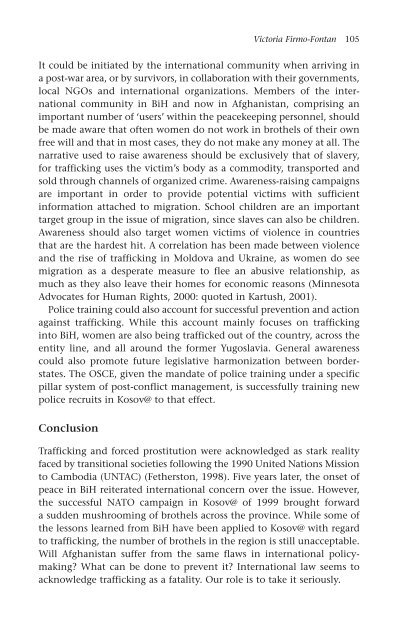3071-The political economy of new slavery
3071-The political economy of new slavery
3071-The political economy of new slavery
Create successful ePaper yourself
Turn your PDF publications into a flip-book with our unique Google optimized e-Paper software.
Victoria Firmo-Fontan 105<br />
It could be initiated by the international community when arriving in<br />
a post-war area, or by survivors, in collaboration with their governments,<br />
local NGOs and international organizations. Members <strong>of</strong> the international<br />
community in BiH and now in Afghanistan, comprising an<br />
important number <strong>of</strong> ‘users’ within the peacekeeping personnel, should<br />
be made aware that <strong>of</strong>ten women do not work in brothels <strong>of</strong> their own<br />
free will and that in most cases, they do not make any money at all. <strong>The</strong><br />
narrative used to raise awareness should be exclusively that <strong>of</strong> <strong>slavery</strong>,<br />
for trafficking uses the victim’s body as a commodity, transported and<br />
sold through channels <strong>of</strong> organized crime. Awareness-raising campaigns<br />
are important in order to provide potential victims with sufficient<br />
information attached to migration. School children are an important<br />
target group in the issue <strong>of</strong> migration, since slaves can also be children.<br />
Awareness should also target women victims <strong>of</strong> violence in countries<br />
that are the hardest hit. A correlation has been made between violence<br />
and the rise <strong>of</strong> trafficking in Moldova and Ukraine, as women do see<br />
migration as a desperate measure to flee an abusive relationship, as<br />
much as they also leave their homes for economic reasons (Minnesota<br />
Advocates for Human Rights, 2000: quoted in Kartush, 2001).<br />
Police training could also account for successful prevention and action<br />
against trafficking. While this account mainly focuses on trafficking<br />
into BiH, women are also being trafficked out <strong>of</strong> the country, across the<br />
entity line, and all around the former Yugoslavia. General awareness<br />
could also promote future legislative harmonization between borderstates.<br />
<strong>The</strong> OSCE, given the mandate <strong>of</strong> police training under a specific<br />
pillar system <strong>of</strong> post-conflict management, is successfully training <strong>new</strong><br />
police recruits in Kosov@ to that effect.<br />
Conclusion<br />
Trafficking and forced prostitution were acknowledged as stark reality<br />
faced by transitional societies following the 1990 United Nations Mission<br />
to Cambodia (UNTAC) (Fetherston, 1998). Five years later, the onset <strong>of</strong><br />
peace in BiH reiterated international concern over the issue. However,<br />
the successful NATO campaign in Kosov@ <strong>of</strong> 1999 brought forward<br />
a sudden mushrooming <strong>of</strong> brothels across the province. While some <strong>of</strong><br />
the lessons learned from BiH have been applied to Kosov@ with regard<br />
to trafficking, the number <strong>of</strong> brothels in the region is still unacceptable.<br />
Will Afghanistan suffer from the same flaws in international policymaking?<br />
What can be done to prevent it? International law seems to<br />
acknowledge trafficking as a fatality. Our role is to take it seriously.


